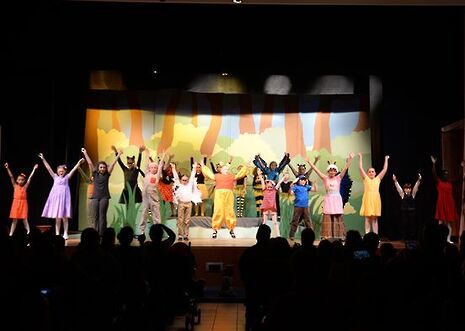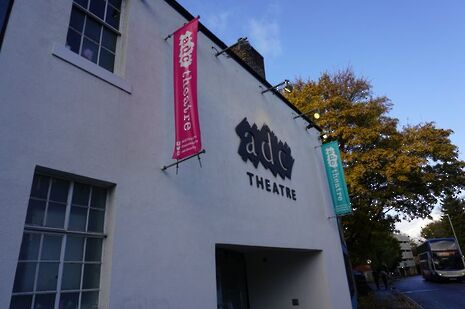Bringing people together: ‘Theatre is something that marks humanity’
“There is no question that theatre builds community and is an enriching experience for the people who take part”. In her first column, Zoe Barnes shares her take on why the theatre is so crucial

In Cambridge, you can never really escape from the theatre and its different crowds. You will find them most notably either gathered in the ADC bar until 3am comparing CamDram credits, or in a dank basement throwing dildos at each other and considering how such a thing might be inducted into their new “art°sound” guerilla theatre collective, complete with blurry film photography. Both are given to sometimes mawkishly revelling in their own produce, but both form strong links, beneficial to themselves but also, arguably, to others.
In Cambridge, theatre is both a burden and a beacon to those involved, allowing for creativity and the production of something personal outside of academic work, but also creating a solid support group who can, for the most part, sympathise with a missed deadline. In the wider world, theatre crosses international, linguistic and social boundaries.
There is no question that theatre builds community and is an enriching experience for the people who take part, but it could also be said to have a role in a wider, non-practising community. Amateur dramatics involve more participants and present more performances of a greater number of productions, playing to a larger audience than any other art. Up and down the country, you will find pockets of people of different ages, genders, social backgrounds and with different life experiences drawing together to create a product, with a view to both gaining as an individual and entertaining.
“Theatre unites people who might never have had any other reason to associate on a regular basis”
No matter whether a local village hall puts on The Sound of Music for the seventh year running and Captain von Trapp has a sore throat, or if a West End theatre has just gone out on a limb debuting a new South Korean interpretation of Reinhard Sorge’s Der Bettler, theatre brings people together.
Theatre unites people who might never have had any other reason to associate on a regular basis, while also being an industry that often plays a role in engaging with people at the fringes of society, e.g. in prisons, and in the revitalisation of neglected neighbourhoods. It humanises, even as prison dehumanises and tabloid presses are all too keen to dehumanise those on the fringes of society.
In schools, theatre is also used as a means to help those involved grow in confidence, and to forge a school community where everyone can look to getting involved as an actor, designer, director or even simply as a supporter to those involved.
There are still a great many issues regarding access to theatre and visibility of certain forms of theatre, something that can be keenly observed in Cambridge. But the performance of theatre is a universal cultural phenomenon known to exist in seemingly endlessly varying forms around the world. It is something that marks humanity, and gives some of the keenest glimpses into what it means to be human.

We can perhaps learn more about diverse cultures from their theatre than we ever could from film, television or literature. We learn about how a culture sees itself, how both its art and literature developed to create a performance – the costumes and sets are particular to dress-styles and images of the world through someone else’s eyes, but they are also particular to artistic expression.
The stories depicted can be thousands of years old and yet completely particular to a contemporary setting, because they are the stories of a people told by those people in the style of their people. The dialogue, whether sung, formal or informal and frenzied, gives clues as to historical sensibilities and the role of speech and the written word. The pace and length of a piece showcases a culture’s relation to time and the importance placed on a work of art, as does the traditional space in which it might take place, whether a temple or a street corner.
“Theatre reminds us that, even in this ever-changing era of technological advancement, of social media and instant news from every corner of the world, there is a human body at the centre of every digital transaction”
Finally, theatre could be considered the creative expression of a basic human instinct to mimic, to create stories about the people and the world around us, and to better understand and bear it through narrative and metaphor. A report compiled by the Brooklyn Commune Project, entitled The View from Here, stresses the links between theatre and citizenship in the United States, but its conclusions are universal, noting that performing arts “are inherently social arts and provide a necessary opportunity to develop the skills of socialisation and communication required by a healthy democracy”.
Theatre reminds us that, even in this ever-changing era of technological advancement, of social media and instant news from every corner of the world, there is a human body at the centre of every digital transaction, and that the human body can create and be a work of art, through which we can empathise with the individual. When we’re ready to tear each other apart for an ADC mainshow slot and when we see people in the theatre seemingly forming ever more closely knit cliques, let us remember that
 News / Cambridge academics sign open letter criticising research funding changes22 February 2026
News / Cambridge academics sign open letter criticising research funding changes22 February 2026 News / Supporters protest potential vet school closure22 February 2026
News / Supporters protest potential vet school closure22 February 2026 News / University Council rescinds University Centre membership20 February 2026
News / University Council rescinds University Centre membership20 February 2026 News / Hundreds of Cambridge academics demand vote on fate of vet course20 February 2026
News / Hundreds of Cambridge academics demand vote on fate of vet course20 February 2026 Comment / A tongue-in-cheek petition for gowned exams at Cambridge 21 February 2026
Comment / A tongue-in-cheek petition for gowned exams at Cambridge 21 February 2026








